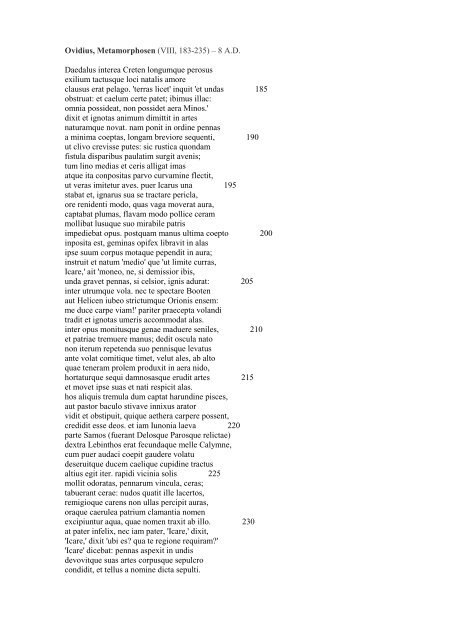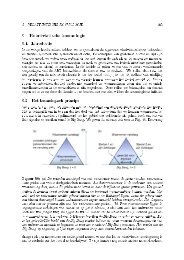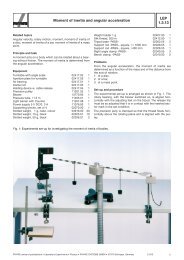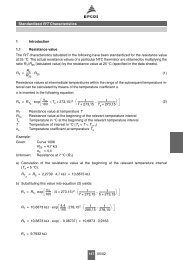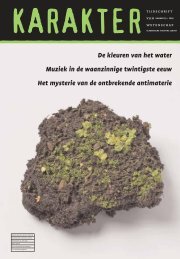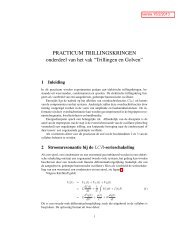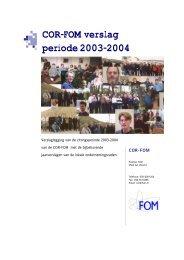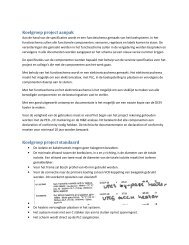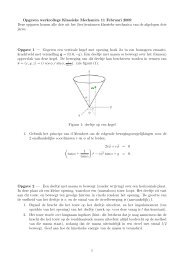Ovidius, Metamorphosen (VIII, 183-235) – 8 A.D. Daedalus ... - Nikhef
Ovidius, Metamorphosen (VIII, 183-235) – 8 A.D. Daedalus ... - Nikhef
Ovidius, Metamorphosen (VIII, 183-235) – 8 A.D. Daedalus ... - Nikhef
You also want an ePaper? Increase the reach of your titles
YUMPU automatically turns print PDFs into web optimized ePapers that Google loves.
<strong>Ovidius</strong>, <strong>Metamorphosen</strong> (<strong>VIII</strong>, <strong>183</strong>-<strong>235</strong>) <strong>–</strong> 8 A.D.<br />
<strong>Daedalus</strong> interea Creten longumque perosus<br />
exilium tactusque loci natalis amore<br />
clausus erat pelago. 'terras licet' inquit 'et undas 185<br />
obstruat: et caelum certe patet; ibimus illac:<br />
omnia possideat, non possidet aera Minos.'<br />
dixit et ignotas animum dimittit in artes<br />
naturamque novat. nam ponit in ordine pennas<br />
a minima coeptas, longam breviore sequenti, 190<br />
ut clivo crevisse putes: sic rustica quondam<br />
fistula disparibus paulatim surgit avenis;<br />
tum lino medias et ceris alligat imas<br />
atque ita conpositas parvo curvamine flectit,<br />
ut veras imitetur aves. puer Icarus una 195<br />
stabat et, ignarus sua se tractare pericla,<br />
ore renidenti modo, quas vaga moverat aura,<br />
captabat plumas, flavam modo pollice ceram<br />
mollibat lusuque suo mirabile patris<br />
impediebat opus. postquam manus ultima coepto 200<br />
inposita est, geminas opifex libravit in alas<br />
ipse suum corpus motaque pependit in aura;<br />
instruit et natum 'medio' que 'ut limite curras,<br />
Icare,' ait 'moneo, ne, si demissior ibis,<br />
unda gravet pennas, si celsior, ignis adurat: 205<br />
inter utrumque vola. nec te spectare Booten<br />
aut Helicen iubeo strictumque Orionis ensem:<br />
me duce carpe viam!' pariter praecepta volandi<br />
tradit et ignotas umeris accommodat alas.<br />
inter opus monitusque genae maduere seniles, 210<br />
et patriae tremuere manus; dedit oscula nato<br />
non iterum repetenda suo pennisque levatus<br />
ante volat comitique timet, velut ales, ab alto<br />
quae teneram prolem produxit in aera nido,<br />
hortaturque sequi damnosasque erudit artes 215<br />
et movet ipse suas et nati respicit alas.<br />
hos aliquis tremula dum captat harundine pisces,<br />
aut pastor baculo stivave innixus arator<br />
vidit et obstipuit, quique aethera carpere possent,<br />
credidit esse deos. et iam Iunonia laeva 220<br />
parte Samos (fuerant Delosque Parosque relictae)<br />
dextra Lebinthos erat fecundaque melle Calymne,<br />
cum puer audaci coepit gaudere volatu<br />
deseruitque ducem caelique cupidine tractus<br />
altius egit iter. rapidi vicinia solis 225<br />
mollit odoratas, pennarum vincula, ceras;<br />
tabuerant cerae: nudos quatit ille lacertos,<br />
remigioque carens non ullas percipit auras,<br />
oraque caerulea patrium clamantia nomen<br />
excipiuntur aqua, quae nomen traxit ab illo. 230<br />
at pater infelix, nec iam pater, 'Icare,' dixit,<br />
'Icare,' dixit 'ubi es? qua te regione requiram?'<br />
'Icare' dicebat: pennas aspexit in undis<br />
devovitque suas artes corpusque sepulcro<br />
condidit, et tellus a nomine dicta sepulti.
Ovid’s Metamorphoses <strong>–</strong> Translated into English verse under the direction of Sir<br />
Samuel Garth by John Dryden, Alexander Pope, Joseph Addison, William Congreve<br />
and other eminent hands (1818)<br />
In tedious exile now too long detain'd,<br />
<strong>Daedalus</strong> languish'd for his native land:<br />
The sea foreclos'd his flight; yet thus he said:<br />
Tho' Earth and water in subjection laid,<br />
O cruel Minos, thy dominion be,<br />
We'll go thro' air; for sure the air is free.<br />
Then to new arts his cunning thought applies,<br />
And to improve the work of Nature tries.<br />
A row of quils in gradual order plac'd,<br />
Rise by degrees in length from first to last;<br />
As on a cliff th' ascending thicket grows,<br />
Or, different reeds the rural pipe compose.<br />
Along the middle runs a twine of flax,<br />
The bottom stems are joyn'd by pliant wax.<br />
Thus, well compact, a hollow bending brings<br />
The fine composure into real wings.<br />
His boy, young Icarus, that near him stood,<br />
Unthinking of his fate, with smiles pursu'd<br />
The floating feathers, which the moving air<br />
Bore loosely from the ground, and wasted here and there.<br />
Or with the wax impertinently play'd,<br />
And with his childish tricks the great design delay'd.<br />
The final master-stroke at last impos'd,<br />
And now, the neat machine compleatly clos'd;<br />
Fitting his pinions on, a flight he tries,<br />
And hung self-ballanc'd in the beaten skies.<br />
Then thus instructs his child: My boy, take care<br />
To wing your course along the middle air;<br />
If low, the surges wet your flagging plumes;<br />
If high, the sun the melting wax consumes:<br />
Steer between both: nor to the northern skies,<br />
Nor south Orion turn your giddy eyes;<br />
But follow me: let me before you lay<br />
Rules for the flight, and mark the pathless way.<br />
Then teaching, with a fond concern, his son,<br />
He took the untry'd wings, and fix'd 'em on;<br />
But fix'd with trembling hands; and as he speaks,<br />
The tears roul gently down his aged cheeks.<br />
Then kiss'd, and in his arms embrac'd him fast,<br />
But knew not this embrace must be the last.<br />
And mounting upward, as he wings his flight,<br />
Back on his charge he turns his aking sight;<br />
As parent birds, when first their callow care<br />
Leave the high nest to tempt the liquid air.<br />
Then chears him on, and oft, with fatal art,
Reminds the stripling to perform his part.<br />
These, as the angler at the silent brook,<br />
Or mountain-shepherd leaning on his crook,<br />
Or gaping plowman, from the vale descries,<br />
They stare, and view 'em with religious eyes,<br />
And strait conclude 'em Gods; since none, but they,<br />
Thro' their own azure skies cou'd find a way.<br />
Now Delos, Paros on the left are seen,<br />
And Samos, favour'd by Jove's haughty queen;<br />
Upon the right, the isle Lebynthos nam'd,<br />
And fair Calymne for its honey fam'd.<br />
When now the boy, whose childish thoughts aspire<br />
To loftier aims, and make him ramble high'r,<br />
Grown wild, and wanton, more embolden'd flies<br />
Far from his guide, and soars among the skies.<br />
The soft'ning wax, that felt a nearer sun,<br />
Dissolv'd apace, and soon began to run.<br />
The youth in vain his melting pinions shakes,<br />
His feathers gone, no longer air he takes:<br />
Oh! Father, father, as he strove to cry,<br />
Down to the sea he tumbled from on high,<br />
And found his Fate; yet still subsists by fame,<br />
Among those waters that retain his name.<br />
The father, now no more a father, cries,<br />
Ho Icarus! where are you? as he flies;<br />
Where shall I seek my boy? he cries again,<br />
And saw his feathers scatter'd on the main.<br />
Then curs'd his art; and fun'ral rites confer'd,<br />
Naming the country from the youth interr'd.
W.H. Auden, Musée des Beaux Arts<br />
About suffering they were never wrong,<br />
The Old Masters: how well they understood<br />
Its human position; how it takes place<br />
While someone else is eating or opening a window or just walking dully along;<br />
How, when the aged are reverently, passionately waiting<br />
For the miraculous birth, there always must be<br />
Children who did not specially want it to happen, skating<br />
On a pond at the edge of the wood:<br />
They never forgot<br />
That even the dreadful martyrdom must run its course<br />
Anyhow in a corner, some untidy spot<br />
Where the dogs go on with their doggy life and the torturer's horse<br />
Scratches its innocent behind on a tree.<br />
In Breughel's Icarus, for instance: how everything turns away<br />
Quite leisurely from the disaster; the ploughman may<br />
Have heard the splash, the forsaken cry,<br />
But for him it was not an important failure; the sun shone<br />
As it had to on the white legs disappearing into the green<br />
Water; and the expensive delicate ship that must have seen<br />
Something amazing, a boy falling out of the sky,<br />
had somewhere to get to and sailed calmly on.<br />
1938
W.H. Auden: Musée des Beaux-Arts<br />
Wat het lijden betreft, waren zij feilloos,<br />
de oude meesters, zij begrepen volkomen<br />
de menselijke staat, hoe het plaats vindt<br />
terwijl een ander eet, een raam openzet, of alleen maar<br />
domweg voorbijloopt,<br />
hoe, wanneer oudere mensen met eerbied en hartstocht<br />
de miraculeuze geboorte verbeiden,<br />
er altijd kinderen zijn die, aan het schaatsen<br />
op een vijver aan de rand van het bos,<br />
daar nu juist niet bepaald op staan te wachten.<br />
Zij verloren nooit uit het oog dat het gruwelijk<br />
lot van een martelaar, hoe dan ook,<br />
voltrokken wordt in een uithoek, een onaanzienlijke plaats,<br />
waar honden hun honderig leven leiden en het paard van de beul<br />
zijn onschuldig achterste schurkt aan een boom.<br />
Op Breughel's Icarus bijvoorbeeld keert alles zich op zijn dode gemak<br />
af van de ramp, de ploeger zou<br />
de plons kunnen hebben gehoord, de verzaakte schreeuw, maar voor hem<br />
is het een mislukking van geen enkel belang, de zon schijnt<br />
zoals hij dat moest doen, op de witte benen die bijna<br />
in het groene water verdwenen zijn,<br />
het kostbare, kwetsbare schip, dat toch wel iets<br />
merkwaardigs zal hebben gezien: een jongen<br />
die viel uit de hemel,<br />
moest ergens op tijd zijn en zeilt rustig voort.<br />
(vertaling Jan Emmens)
W.C. Williams, Landscape with the Fall of Icarus<br />
According to Brueghel<br />
when Icarus fell<br />
it was spring<br />
a farmer was ploughing<br />
his field<br />
the whole pageantry<br />
of the year was<br />
awake tingling<br />
with itself<br />
sweating in the sun<br />
that melted<br />
the wings' wax<br />
unsignificantly<br />
off the coast<br />
there was<br />
a splash quite unnoticed<br />
this was<br />
Icarus drowning<br />
(1962)
Anne Sexton, To a Friend Whose Work Has Come to Triumph<br />
Consider Icarus, pasting those sticky wings on,<br />
testing that strange little tug at his shoulder blade,<br />
and think of that first flawless moment over the lawn<br />
of the labyrinth. Think of the difference it made!<br />
There below are the trees, as awkward as camels;<br />
and here are the shocked starlings pumping past<br />
and think of innocent Icarus who is doing quite well.<br />
Larger than a sail, over the fog and the blast<br />
of the plushy ocean, he goes. Admire his wings!<br />
Feel the fire at his neck and see how casually<br />
he glances up and is caught, wondrously tunneling<br />
into that hot eye. Who cares that he fell back to the sea?<br />
See him acclaiming the sun and come plunging down<br />
while his sensible daddy goes straight into town.<br />
(1962)
Edward Field, Icarus<br />
Only the feathers floating around the hat<br />
Showed that anything more spectacular had occurred<br />
Than the usual drowning. The police preferred to ignore<br />
The confusing aspects of the case,<br />
And the witnesses ran off to a gang war.<br />
So the report filed and forgotten in the archives read simply<br />
Drowned, but it was wrong: Icarus<br />
Had swum away, coming at last to the city<br />
Where he rented a house and tended the garden.<br />
That nice Mr. Hicks the neighbors called him,<br />
Never dreaming that the gray, respectable suit<br />
Concealed arms that had controlled huge wings<br />
Nor that those sad, defeated eyes had once<br />
Compelled the sun. And had he told them<br />
They would have answered with a shocked, uncomprehending stare.<br />
No, he could not disturb their neat front yards;<br />
Yet all his books insisted that this was a horrible mistake:<br />
What was he doing aging in a suburb?<br />
Can the genius of the hero fall<br />
To the middling stature of the merely talented?<br />
And nightly Icarus probes his wound<br />
And daily in his workshop, curtains carefully drawn,<br />
Constructs small wings and tries to fly<br />
To the lighting fixture on the ceiling:<br />
Fails every time and hates himself for trying.<br />
He had thought himself a hero, had acted heroically,<br />
And now dreamt of his fall, the tragic fall of the hero;<br />
But now rides commuter trains,<br />
Serves on various committees,<br />
And wishes he had drowned.<br />
(1950)
Muriel Rukeyser, Waiting for Icarus<br />
He said he would be back and we'd drink wine together<br />
He said that everything would be better than before<br />
He said we were on the edge of a new relation<br />
He said he would never again cringe before his father<br />
He said that he was going to invent full-time<br />
He said he loved me that going into me<br />
He said was going into the world and the sky<br />
He said all the buckles were very firm<br />
He said the wax was the best wax<br />
He said Wait for me here on the beach<br />
He said Just don't cry<br />
I remember the gulls and the waves<br />
I remember the islands going dark on the sea<br />
I remember the girls laughing,<br />
I remember they said he only wanted to get away from me<br />
I remember mother saying: Inventors are like poets, a trashy lot<br />
I remember she told me those who try out inventions are worse<br />
I remember she added: Women who love such are the worst of all<br />
I have been waiting all day, or perhaps longer.<br />
I would have liked to try those wings myself.<br />
It would have been better than this.<br />
(1973)


